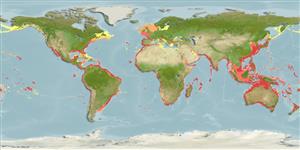Common names from other countries
分类 / Names
俗名 | 同种异名 | Catalog of Fishes(属, 种) | ITIS | CoL | WoRMS | Cloffa
Teleostei >
Carangiformes (Jacks)
鱸形目 (Jacks) >
Carangidae (Jacks and pompanos) > Naucratinae
Etymology: Naucrates: Greek, naykrates, -es, -es = supremacy in the sea (Ref. 45335).
More on author: Linnaeus.
Environment: milieu / climate zone / depth range / distribution range
生态学
海洋 礁区鱼类; 深度上下限 0 - 300 m (Ref. 86942). 亞熱帶的; 61°N - 43°S, 180°W - 180°E
Circumtropical in tropical seas. Western Atlantic: Nova Scotia, Canada to Argentina (Ref. 7251). Eastern Atlantic: British Isles (rare vagrant), Norway and Bay of Biscay to Namibia, including the Mediterranean and Canary Islands. Eastern Pacific: Vancouver Island (British Columbia, Canada) to the Galapagos Islands (Ref. 2850) and Chile (Ref. 115205). Common throughout the Indian Ocean (Ref. 3197).
在熱帶的海洋中的 Circumtropical。 西大西洋: 加拿大的新斯科舍省到阿根廷.(參考文獻 7251) 東大西洋: 不列顛群島 (稀有的漂泊) 與比斯開灣到安哥拉, 包括地中海與加納利群島。 東太平洋: 溫哥華島 (加拿大卑詩省) 到加拉巴哥島島.(參考文獻 2850) 普遍的在印度洋各處.(參考文獻 3197)
大小 / 重量 / 年龄
Maturity: Lm ? range ? - ? cm
Max length : 70.0 cm TL 雄鱼/尚未辨别雌雄; (Ref. 5288); common length : 40.0 cm TL 雄鱼/尚未辨别雌雄; (Ref. 9626)
背棘 (总数) : 5 - 6; 背的软条 (总数) : 25 - 29; 臀棘: 3; 臀鳍软条: 15 - 17. Body elongate, slender, and not strongly compressed; posterior end of upper jaw located at anterior rim of eye; dorsal fin with 4 or 5 spines followed by another spine and 25 to 29 soft rays (IV-V+I 25-29); lateral line without scutes; caudal peduncle with well developed fleshy keels and with dorsal and ventral peduncular fossae (Ref. 55763). Body dark to pale bluish, with 6-7 broad, dark bars; white tips on caudal lobes and on second dorsal and anal lobes (Ref. 3197).
细长的身体, 细长的, 而不是非常扁长形的; 上颌的后端位于了眼的前面边缘; 背鳍有 4 或 5根棘跟随着另一根棘与 25 到 29个软鳍条了;(4 V 的+I 25-29) 没有鳞甲的侧线; 尾梗有发展良好的肉质龙骨脊而且有背部与腹部的肉梗小窝。 (参考文献 55763) 身体深色的到灰蓝色的, 有 6-7 宽又深色的横带; 在尾叶与第二背鳍与尾鳍叶上的白色的顶端.(参考文献 3197)
Oceanic species with a semi-obligate commensal relationship with sharks, rays, other bony fishes and turtles (Ref. 5217). Young are usually associated with jellyfish and drifting seaweed (Ref. 2850, 9563). Feed on scraps of host's left over, parasites and excrement; also on small fishes and invertebrates (Ref. 5288). Eggs are pelagic (Ref. 4233). Marketed fresh and salted or dried (Ref. 9283). Captured at the surface using hand nets (Ref. 26165).
大洋性鱼种具有一个和鲨鱼, ,其他硬骨鱼类与海龟的半互利共生关系。 (参考文献 5217) 幼鱼通常被伴随着水母与漂流的海草。 (参考文献 2850,9563) 吃寄主的吃剩的东西,寄生虫与排泄物的小片; 也捕食小鱼与无脊椎动物.(参考文献 5288) 在市场上销售生鲜地了与盐腌或乾燥的.(参考文献 9283) 捕获在水表面使用手抄网。 (参考文献 26165)
Life cycle and mating behavior
Maturities | 繁殖 | Spawnings | Egg(s) | Fecundities | 仔鱼
在熱帶的海洋中的 Circumtropical。 西大西洋: 加拿大的新斯科舍省到阿根廷.(參考文獻 7251) 東大西洋: 不列顛群島 (稀有的漂泊) 與比斯開灣到安哥拉, 包括地中海與加納利群島。 東太平洋: 溫哥華島 (加拿大卑詩省) 到加拉巴哥島島.(參考文獻 2850) 普遍的在印度洋各處.(參考文獻 3197)
Smith-Vaniz, W.F., J.-C. Quéro and M. Desoutter, 1990. Carangidae. p. 729-755. In J.C. Quero, J.C. Hureau, C. Karrer, A. Post and L. Saldanha (eds.) Check-list of the fishes of the eastern tropical Atlantic (CLOFETA). JNICT, Lisbon; SEI, Paris; and UNESCO, Paris. Vol. 2. (Ref. 7097)
CITES (Ref. 128078)
Not Evaluated
人类利用
渔业: 低经济; 游钓鱼种: 是的; 水族馆: 公众的水族馆
工具
特别资料
下载 XML
网络资源
Estimates based on models
Preferred temperature (Ref.
115969): 7.9 - 28.1, mean 20.9 (based on 3025 cells).
Phylogenetic diversity index (Ref.
82804): PD
50 = 1.0000 [Uniqueness, from 0.5 = low to 2.0 = high].
Bayesian length-weight: a=0.01380 (0.00638 - 0.02986), b=2.94 (2.75 - 3.13), in cm Total Length, based on LWR estimates for this species & (Sub)family-body (Ref.
93245).
营养阶层 (Ref.
69278): 3.4 ±0.43 se; based on food items.
回复力 (Ref.
120179): 中等的, 族群倍增时间最少 1.4 - 4.4年 (Preliminary K or Fecundity.).
Fishing Vulnerability (Ref.
59153): Moderate to high vulnerability (48 of 100).
